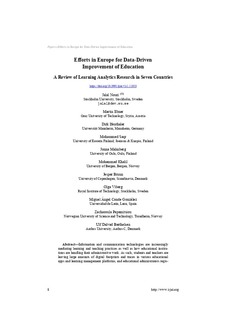| dc.contributor.author | Nouri, Jalal | |
| dc.contributor.author | Ebner, Martin | |
| dc.contributor.author | Ifenthaler, Dirk | |
| dc.contributor.author | Sqr, Mohammed | |
| dc.contributor.author | Malmberg, Jonna | |
| dc.contributor.author | Khalil, Mohammad | |
| dc.contributor.author | Bruun, Jesper | |
| dc.contributor.author | Viberg, Olga | |
| dc.contributor.author | González, Miguel Ángel Conde | |
| dc.contributor.author | Papamitsiou, Zacharoula | |
| dc.contributor.author | Berthelsen, Ulf Dalvad | |
| dc.date.accessioned | 2020-02-11T11:56:13Z | |
| dc.date.available | 2020-02-11T11:56:13Z | |
| dc.date.created | 2020-01-23T10:31:54Z | |
| dc.date.issued | 2019 | |
| dc.identifier.citation | International Journal of Learning Analytics and Artificial Intelligence for Education. 2019, 1 (1), 8-27. | nb_NO |
| dc.identifier.issn | 2706-7564 | |
| dc.identifier.uri | http://hdl.handle.net/11250/2641021 | |
| dc.description.abstract | Information and communication technologies are increasingly mediating learning and teaching practices as well as how educational institutions are handling their administrative work. As such, students and teachers are leaving large amounts of digital footprints and traces in various educational apps and learning management platforms, and educational administrators register various processes and outcomes in digital administrative systems. It is against such a background we in recent years have seen the emergence of the fast-growing and multi-disciplinary field of learning analytics. In this paper, we examine the research efforts that have been conducted in the field of learning analytics in Austria, Denmark, Finland, Norway, Germany, Spain, and Sweden. More specifically, we report on developed national policies, infrastructures and competence centers, as well as major research projects and developed research strands within the selected countries. The main conclusions of this paper are that the work of researchers around Europe has not led to national adoption or European level strategies for learning analytics. Furthermore, most countries have not established national policies for learners’ data or guidelines that govern the ethical usage of data in research or education. We also conclude, that learning analytics research on pre-university level to high extent have been overlooked. In the same vein, learning analytics has not received enough focus form national and European national bodies. Such funding is necessary for taking steps towards data-driven development of education. | nb_NO |
| dc.language.iso | eng | nb_NO |
| dc.publisher | International Association of Online Engineering | nb_NO |
| dc.rights | Navngivelse 4.0 Internasjonal | * |
| dc.rights.uri | http://creativecommons.org/licenses/by/4.0/deed.no | * |
| dc.title | Efforts in Europe for Data-Driven Improvement of Education–A Review of Learning Analytics Research in Six Countries | nb_NO |
| dc.type | Journal article | nb_NO |
| dc.type | Peer reviewed | nb_NO |
| dc.description.version | publishedVersion | nb_NO |
| dc.source.pagenumber | 8-27 | nb_NO |
| dc.source.volume | 1 | nb_NO |
| dc.source.journal | International Journal of Learning Analytics and Artificial Intelligence for Education | nb_NO |
| dc.source.issue | 1 | nb_NO |
| dc.identifier.doi | https://doi.org/10.3991/ijai.v1i1.11053 | |
| dc.identifier.cristin | 1780629 | |
| dc.description.localcode | Copyright (c) 2019 Jalal Nouri, Martin Ebner, Dirk Ifenthaler, Mohammed Saqr, Jonna Malmberg, Mohammad Khalil, Olga Viberg, Jesper Bruun, Miguel Ángel Conde González, Zacharoula Papamitsiou, Ulf Dalvad Berthelsen. Under a CC-BY 4.0 license. | nb_NO |
| cristin.unitcode | 194,63,10,0 | |
| cristin.unitname | Institutt for datateknologi og informatikk | |
| cristin.ispublished | true | |
| cristin.fulltext | original | |

